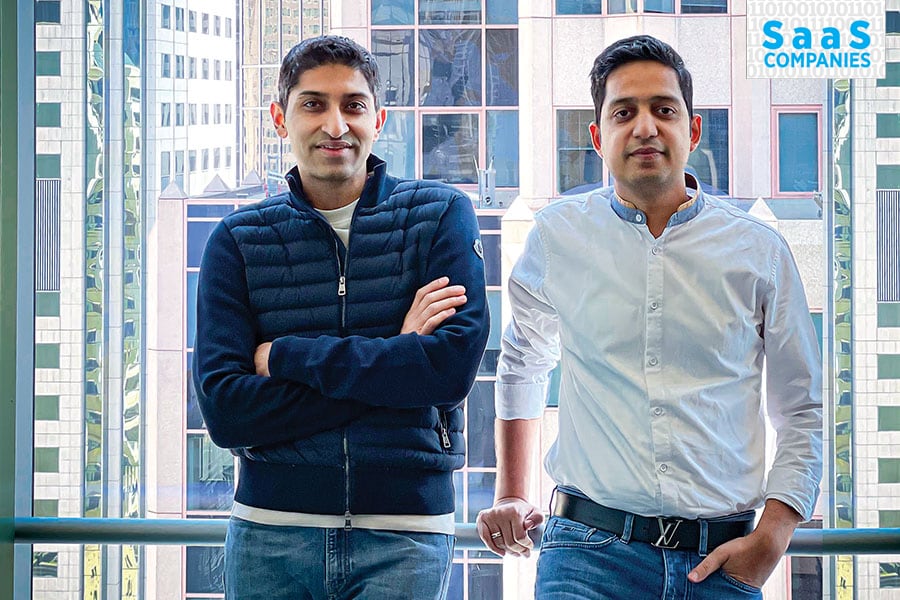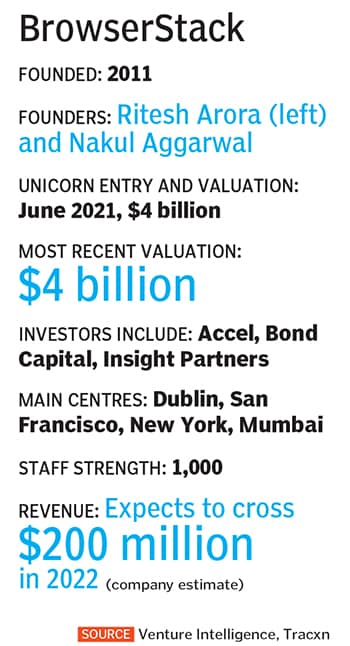
How unicorn Browserstack became a profitable $100 million Indian Saas company
BrowserStack has helped millions of developers accelerate and automate their tests, bringing testing closer to writing code; now it wants to become the go-to testing infrastructure for the internet of the future
 Ritesh Arora and Nakul Aggarwal, co-founders, BrowserStack
Ritesh Arora and Nakul Aggarwal, co-founders, BrowserStack
By the time BrowserStack did a Series A in 2018—$50 million straightaway, from just Accel—it was a profitable venture with some of the world’s biggest companies as customers using its browser-testing product.
The company was the result of founders Ritesh Arora and Nakul Aggarwal’s experience with testing code, which the serial entrepreneurs had done in their previous ventures and didn’t want to, again.
The IIT-Bombay graduates had hit upon a problem to solve that was so relevant that they’d become profitable within the first six months of starting the company in Mumbai in 2011.
They had worked for four months to build a beta version of BrowserStack, a cross-browser and app testing platform—starting with tests for Microsoft’s Internet Explorer. When they got 10,000 beta users in the ensuing few months, they launched the commercial version.
By the time the Series A happened, six years later, BrowserStack had four products being used by customers in 135 countries, including the likes of Walt Disney, Tesco, Microsoft, Facebook, Twitter, Airbnb and Virgin Pulse. Today, “we have over a million developers who probably would be using our products on an annual basis globally, and they would be a part of over 55,000 paying customers”, says Arora, who is the CEO. “We are way over $100 million and continue to grow very well,” he says, adding that the company will cross the $200 million annual recurring revenue mark this year. And BrowserStack remains profitable, he emphasises.
(This story appears in the 30 November, -0001 issue of Forbes India. To visit our Archives, click here.)




 After the June 2021 investment, that Accel joined as well, the investing partners acknowledged as much in a short blogpost. “At the core of our 2018 investment was the organic, widespread adoption of BrowserStack within the developer community,” wrote Nate Niparko, Ryan Sweeney and Shekhar Kirani, partners at Accel. Historically, software testing was relegated to siloed quality assurance teams, but BrowserStack has helped millions of developers accelerate and automate their tests, bringing testing closer to writing code. “This developer-first approach has been a common theme across our portfolio, including Algolia,
After the June 2021 investment, that Accel joined as well, the investing partners acknowledged as much in a short blogpost. “At the core of our 2018 investment was the organic, widespread adoption of BrowserStack within the developer community,” wrote Nate Niparko, Ryan Sweeney and Shekhar Kirani, partners at Accel. Historically, software testing was relegated to siloed quality assurance teams, but BrowserStack has helped millions of developers accelerate and automate their tests, bringing testing closer to writing code. “This developer-first approach has been a common theme across our portfolio, including Algolia, 





